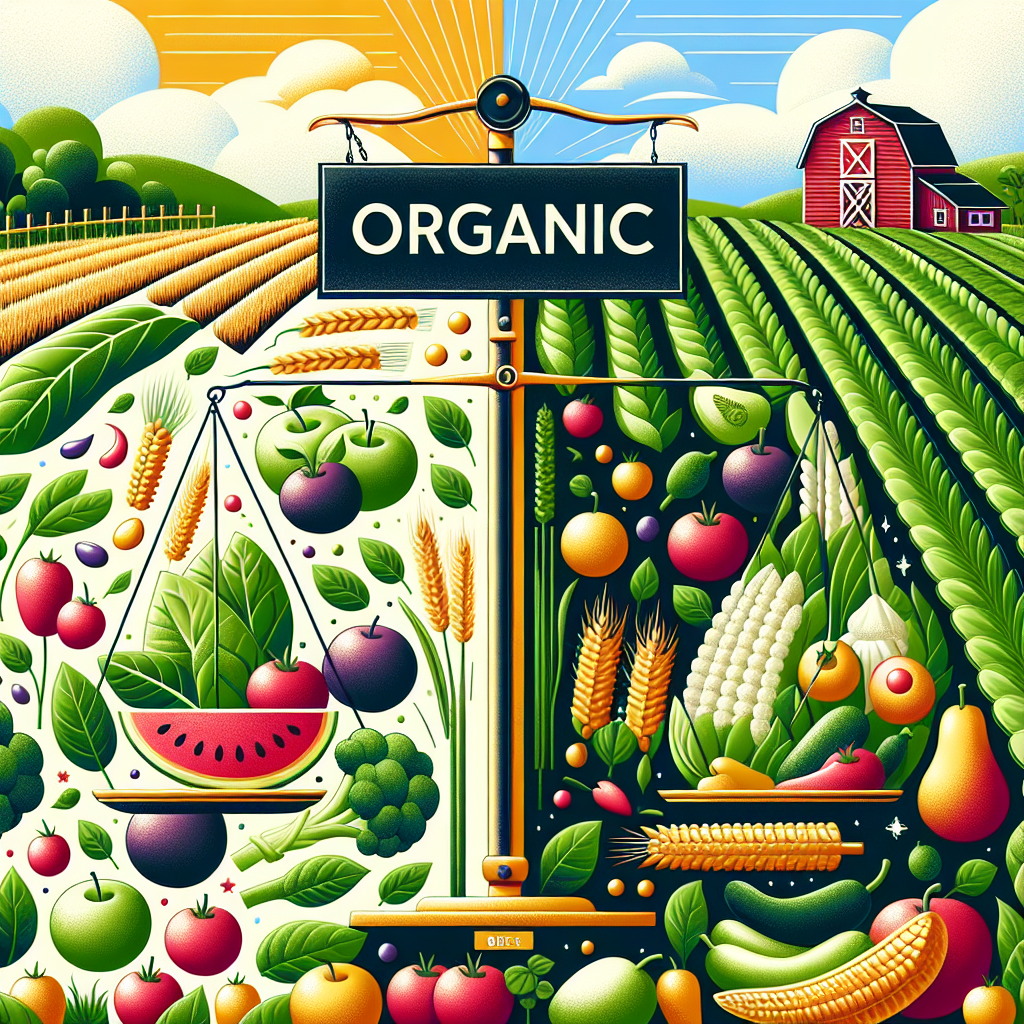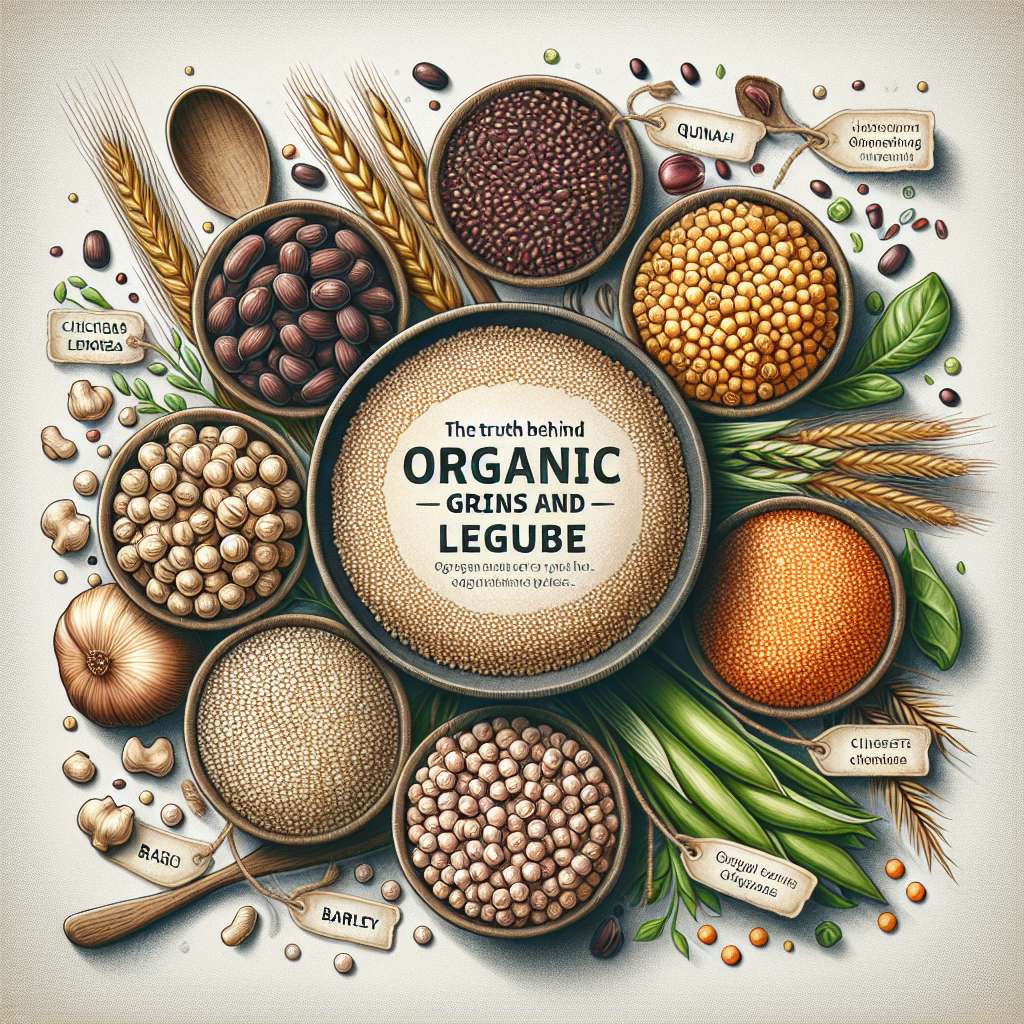Introduction

In recent years, the term “organic” has become a buzzword in the food industry. Consumers are increasingly seeking out organic products, including grains and legumes, due to perceived health benefits and environmental concerns. But what exactly makes organic grains and legumes different from their conventionally grown counterparts? This article aims to shed light on the advantages of organic grains and legumes, their nutritional values, and how they contribute to overall health and well-being.
What Does “Organic” Mean?

Organic farming refers to agricultural practices that avoid the use of synthetic pesticides, fertilizers, genetically modified organisms (GMOs), antibiotics, and growth hormones. Instead, organic farmers use natural processes and materials to maintain soil fertility and control pests. The goal is to create a more sustainable and environmentally friendly farming system that promotes biodiversity and soil health.
Certification and Standards

For a product to be labeled as “organic,” it must meet specific standards set by regulatory bodies such as the United States Department of Agriculture (USDA) in the U.S., or the European Union Organic Farming regulations in Europe. These standards cover everything from soil quality to animal raising practices and pest and weed control. The certification process involves regular inspections and testing to ensure compliance with these stringent standards.
Nutritional Value of Organic Grains and Legumes
One of the main reasons people opt for organic grains and legumes is the belief that they are more nutritious. While some studies suggest that organic produce may have higher levels of certain nutrients, such as antioxidants, the overall nutritional differences between organic and conventional grains and legumes can vary.
Antioxidants and Phytochemicals
Several studies have shown that organic crops, including grains and legumes, may contain higher levels of antioxidants compared to conventionally grown crops. Antioxidants are essential for combating free radicals in the body, which can cause cellular damage and contribute to chronic diseases such as cancer and heart disease. Additionally, organic crops may have higher levels of phytochemicals, which are compounds that have been shown to offer various health benefits, including anti-inflammatory and anti-cancer properties.
Protein and Fiber
Grains and legumes are known for being rich in protein and fiber, which are essential for a balanced diet. Organic grains such as quinoa, brown rice, and oats are excellent sources of protein and fiber. Legumes like organic lentils, chickpeas, and black beans are also high in protein, making them a great plant-based protein source for vegetarians and vegans. The fiber content in both grains and legumes aids in digestion, helps maintain a healthy weight, and reduces the risk of chronic diseases such as diabetes and heart disease.
Minerals and Vitamins
Organic grains and legumes are also rich in essential minerals and vitamins. For instance, organic whole grains are a good source of B vitamins, iron, magnesium, and selenium. Legumes provide important nutrients such as iron, folate, potassium, and magnesium. The absence of synthetic fertilizers in organic farming might contribute to a more balanced and natural nutrient profile in the soil, which can be reflected in the nutrient content of the crops.
Health Benefits of Organic Grains and Legumes
Including organic grains and legumes in your diet can offer a multitude of health benefits. Here are some of the most significant ones:
Reduced Exposure to Pesticides
One of the most compelling reasons to choose organic grains and legumes is the reduced exposure to pesticides. Conventional farming often uses synthetic pesticides to protect crops from pests and diseases. However, residues of these chemicals can remain on the crops and be ingested by consumers. Long-term exposure to pesticide residues has been linked to various health issues, including hormonal disruption, neurological problems, and an increased risk of certain cancers. By choosing organic, you minimize your exposure to these potentially harmful substances.
Improved Heart Health
Grains and legumes are known for their heart-healthy benefits. The fiber content helps lower cholesterol levels, while the antioxidants protect against oxidative stress and inflammation, both of which are risk factors for heart disease. Studies have shown that diets rich in whole grains and legumes can significantly reduce the risk of cardiovascular diseases.
Better Digestive Health
The high fiber content in organic grains and legumes also promotes better digestive health. Fiber aids in regular bowel movements and helps prevent constipation. It also acts as a prebiotic, feeding the beneficial bacteria in your gut and promoting a healthy gut microbiome. A healthy gut microbiome is linked to better digestion, improved immune function, and even mental health benefits.
Weight Management
Organic grains and legumes are typically low in fat and high in fiber and protein, which makes them very filling. Including them in your diet can help you feel full for longer periods, reducing the likelihood of overeating and aiding in weight management. The complex carbohydrates in whole grains also provide a steady source of energy, preventing blood sugar spikes and crashes that can lead to hunger and overeating.
Environmental Impact of Organic Farming
Choosing organic grains and legumes not only benefits your health but also has a positive impact on the environment. Organic farming practices aim to be sustainable and eco-friendly.
Soil Health
Organic farming emphasizes the importance of maintaining healthy soil. Practices such as crop rotation, cover cropping, and the use of organic compost help improve soil structure and fertility. Healthy soil is more resistant to erosion and can retain more water, which makes organic farms more resilient to droughts and floods.
Biodiversity
Organic farms tend to support greater biodiversity compared to conventional farms. The avoidance of synthetic pesticides and fertilizers helps protect a wide range of organisms, including beneficial insects, birds, and soil microorganisms. This biodiversity can make the farm ecosystem more resilient to pests and diseases.
Reduced Pollution
By avoiding synthetic pesticides and fertilizers, organic farming reduces pollution of waterways and soil. Conventional farming often leads to runoff of chemicals into rivers and lakes, which can harm aquatic life and contaminate drinking water sources. Organic farming practices help protect water quality and reduce the overall environmental footprint of agriculture.
How to Incorporate Organic Grains and Legumes into Your Diet
Incorporating organic grains and legumes into your diet can be both delicious and easy. Here are some simple ways to add them to your meals:
- Breakfast: Start your day with a bowl of organic oatmeal topped with fresh fruits and nuts. You can also make a smoothie with organic quinoa or add organic chia seeds to your yogurt.
- Lunch: Prepare a hearty salad with a mix of organic grains like farro or barley and legumes such as chickpeas or black beans. Add some fresh vegetables and a light dressing for a nutritious meal.
- Dinner: Use organic brown rice or quinoa as a base for a stir-fry featuring organic vegetables and tofu. Another option is to make a lentil stew served with organic whole-grain bread.
- Snacks: Enjoy a handful of roasted organic chickpeas or make a hummus dip using organic chickpeas and serve it with organic whole-grain crackers.
Conclusion
Organic grains and legumes offer a range of health benefits and contribute to a more sustainable and environmentally friendly food system. With their rich nutritional profiles and potential to reduce exposure to harmful pesticides, incorporating organic grains and legumes into your diet can be a positive step toward better health and a healthier planet. Whether you are new to organic foods or a long-time advocate, making the switch to organic grains and legumes is a choice that benefits both you and the environment.
